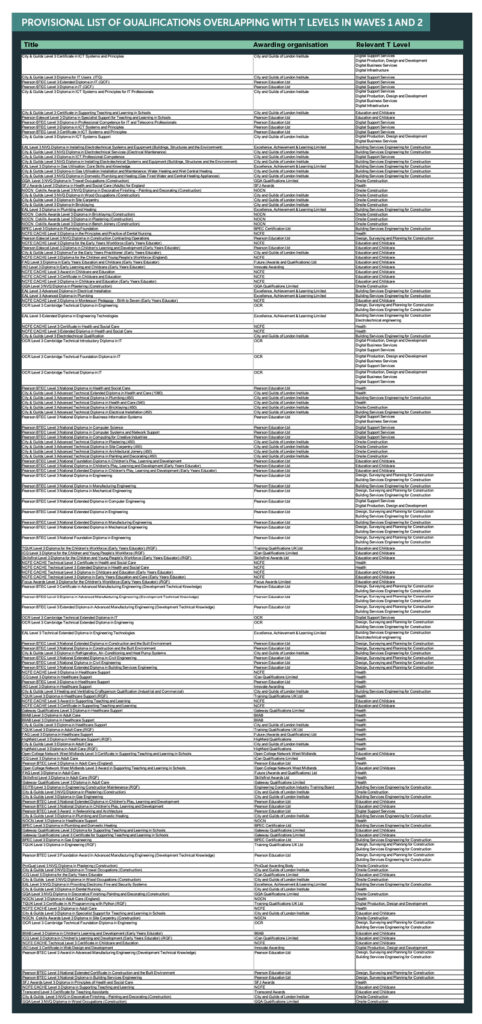More than 150 level 3 qualifications taken by 66,000 students are set to be axed in 2024 as the government clears the way for new T Levels.
Thirty-eight BTECs are part of the first chop list, including a popular course in health and social care that one college principal has said will be a “tragedy” to lose.
Awarding bodies are gearing up to fight the Department for Education over several “important qualifications” on the list which they do not believe meet the published criteria for defunding.
The first provisional list (click here to download or see below) of qualifications that the Department for Education says overlap with the first ten T Levels and face being removed from the system was finally published this week.
In total, just 160 vocational and technical qualifications of the 2,000 overlapping courses will be axed from 2024. An impact assessment shows there are 66,000 enrolments on the courses, 27 per cent of which are students deemed to be the “most disadvantaged”.
There are 662,000 level 3 enrolments for 16-to-19-year-olds nationally – meaning one in ten will be impacted.
Pearson has the most courses on the axe list (41, including 38 BTECs), followed by City & Guilds (36) and then NCFE (19).
Sector leaders said they were pleased only a small proportion of level 3 qualifications are to be cut.
But the Sixth Form Colleges Association said the BTEC diploma in health and social care – one of the qualifications set to be axed – is “enormously popular and well respected by universities and employers”.
The impact of its removal “will be felt by a significant number of young people”.
The BTEC diploma in health and social care is taken by around 200 students at the Colchester Institute, in Essex. Principal Alison Andreas said the qualification’s loss would be a “tragedy”.
She told FE Week: “This is a fantastic and very, very popular course. It gives students a really broad overview of many aspects of health and social care. Students go on to fantastic higher education destinations and work in fields like nursing, midwifery and paramedicine.”
Awarding bodies have been given until July 8 to challenge the decision. The final list will be confirmed in September.
Pearson said over half of the axed qualifications were being withdrawn already as part of its usual cycle of updating products.
It will be challenging “important qualifications” on the list, including the health and social care diploma BTEC. Around 3,000 youngsters completed the qualification last year.
T Levels are the government’s flagship new technical qualifications and sit alongside their academic equivalent A-levels.
Ten T Levels have been rolled out so far in four sectors: construction, digital, education and childcare and health and science. Thirteen more T Level subjects will be launched between September 2022 and 2023.
The DfE wants to strip funding for thousands of “poor quality” qualifications that overlap and leave pupils “confused”.
Andreas said she is not “anti T Levels”, but she is “anti T Levels being the only show in town” because the courses will not be suitable for every student especially as the new technical qualifications require students to follow a “narrow” specialism such as either adult or child nursing.
“When students are aged 15, 16, and 17 they don’t really have a sense of the specific field they want to enter,” she said. “That’s the lovely thing about the BTEC programme, they get a chance to really investigate each section before they make a commitment but in the T Level they have to commit to a particular specialism straight away.”
She added that not all colleges and schools will be able to offer every T Level, which will impact students in rural areas who do not have many education providers to choose from.
Analysis of the level 3 axe list by the Association of Colleges shows the three subject areas with the most general FE college enrolments are health and social care (13,098), engineering (11,510) and child development and wellbeing (8,783).
The top three individual courses on the list are Pearson’s BTEC national foundation diploma in engineering (3,283 enrolments), NCFE’s technical diploma in childcare and education (3,225 enrolments), and Pearson’s BTEC national extended diploma in engineering (3,031 enrolments).
AoC’s deputy chief executive, Julian Gravatt, said T Levels need to be accessible to as broad a range of students as possible but colleges “have concerns that this is not the case currently”.
He admitted there have been “some improvements” since the previous government proposals to reform level 3 qualifications, but warned it is “still concerning to see one in 10 enrolments will be impacted by these changes”, adding that “no student should be left high and dry without a qualification to study”.
NCFE chief executive David Gallagher his awarding body has “concerns over the extent of the defunding and the impact that this might have on our centres and learners”.
David Phillips, managing director of City & Guilds, said that where there are qualifications that have a “clear and unequivocable duplication” with the content of T Levels, there is a case to defund.
However, he added, “we believe that a more thoughtful and nuanced consideration about the implications of defunding so many level 3 qualifications needs to be taken”.
The DfE originally planned to begin phasing out level 3 courses that overlap with T Levels from 2023. But education secretary Nadhim Zahawi announced in November he would delay the cull by a year following pressure from the Protect Student Choice campaign, which is led by the Sixth Form Colleges Association and has high-profile political backing from the likes of Lord Blunkett.
Amid concern that the majority of level 3 courses would be defunded under the plans, Zahawi wrote to members of the House of Lords last month to promise that “significantly less than half” of the qualifications would be included in the cull.
However more qualifications will be defunded in future years.
Skills minister Alex Burghart said retiring qualifications that overlap with “new, more rigorous qualifications has long been standard practice with academic qualifications” and will “help end the confusion and complexity we know puts some young people off studying technical options”.
Tom Bewick, chief executive of the Federation of Awarding Bodies, said he recognised that ministers have listened to sector calls to “proceed with more caution” and ensure “there is a place in the future landscape for level 3 qualifications which have a proven track record of getting students into skilled jobs or progression to further and higher education”.
The 160 level 3 qualifications facing the chop from 2024 (click to enlarge):


















Your thoughts